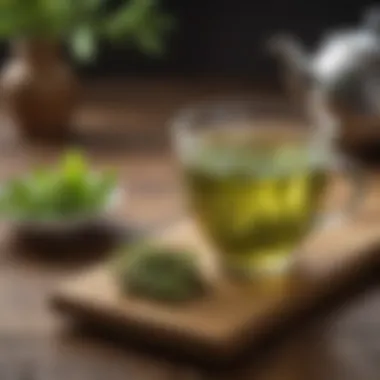Exploring the Benefits of Tea for Skin Health


Intro
Tea is not just a delightful beverage enjoyed around the world; it also provides several benefits for skin health. With a wide range of teas available, each type offers unique properties that contribute positively to skin conditions. This article aims to explore these various teas and their effects, helping readers discover how to incorporate tea into their skincare routines effectively.
Understanding the nutritional components of tea is crucial. Compounds such as antioxidants, vitamins, and polyphenols found in different types of tea play a significant role in promoting skin wellness. From green tea to chamomile, the potential for enhancing skin health is backed by quality research.
By drawing attention to the best types of tea for skin health, along with practical applications, readers can gain valuable insights. The holistic benefits of drinking and applying tea to the skin stretch beyond mere hydration. Thus, the goal is to inform readers about the implications of tea on skin health and how it can become an essential part of their daily routines.
In this guide, we will delve into the properties of various teas, examining their impacts on skin conditions and providing actionable advice on how to utilize them for better skin health.
Prelims to Tea and Skin Health
Tea has been cherished for centuries, not only for its flavorful profile but also for its impressive health benefits. Recent studies suggest that certain types of tea can significantly affect skin health, making it an important topic of discussion. Understanding how tea interacts with our skin can unlock new avenues for enhancing beauty and wellness. This article will explore the connection between tea and skin health, notably its role in hydration, inflammation reduction, and antioxidant support. Those who are keen on skincare will find the insights valuable and worth exploring in their daily routines.
Understanding the Connection
The connection between tea and skin health is rooted in the nuanced properties of tea leaves. Teas, especially green and white, contain high levels of antioxidants known as polyphenols. These compounds combat oxidative stress caused by environmental factors like pollution and UV light, which can prematurely age the skin. Additionally, tea's anti-inflammatory properties may help soothe conditions like acne and rosacea, leading to a healthier complexion.
Moreover, tea can contribute to hydration, which is integral to skin elasticity and overall appearance. Drinking herbal teas or using tea-infused products can maintain moisture levels in the skin and prevent dryness. Thus, incorporating tea into one’s lifestyle is not merely a trend; it is a practical choice backed by science.
"The skin is our body's largest organ, making its health vital. Tea offers a simple, natural way to boost skin wellness through hydration and nutrition."
This section will lay the groundwork for the multifaceted discussions ahead on the nutritional profile of tea, specific types of tea beneficial for skin, and practical applications. By understanding the fundamentals, readers can appreciate the profound impacts of integrating tea into their skincare regimen.
The Nutritional Profile of Tea
The nutritional profile of tea is essential to understanding its impact on skin health. Each type of tea comes with a unique set of nutrients, including significant levels of antioxidants, vitamins, and minerals. These elements work together to promote skin vitality and combat various skin issues. The inclusion of tea in daily routines not only enhances flavor but also offers nutritive benefits that can contribute to healthier skin.
Antioxidants in Tea
Antioxidants are one of the standout features of tea, playing a crucial role in skin protection. Teas are rich in several classes of antioxidants, such as polyphenols and flavonoids. The most studied type, catechins, are abundant in green tea and have been linked to reducing oxidative stress. This oxidative stress can lead to premature aging and skin damage. By consuming tea regularly, one can harness these antioxidants to help in neutralizing free radicals.


Regularly drinking tea, especially varieties like green and white tea, can lead to improvements in skin tone and elasticity. In fact, studies suggest that the efficacy of these antioxidants can even extend to topical applications. Not only do these antioxidants protect the skin from UV damage, but they also support the skin’s healing processes, allowing it to regenerate more effectively after injury or irritation. Incorporating tea, therefore, can serve as a complimentary approach in skincare regimens.
Vitamins and Minerals
Alongside antioxidants, tea is a source of various vitamins and minerals that contribute positively to skin health. For example, vitamin C is present in many herbal teas, assisting in collagen production, which is vital for maintaining skin's firmness and elasticity. Additionally, the presence of vitamin E in certain types of tea helps in moisturizing the skin, preventing dryness, and promoting a smoother complexion.
The mineral content in tea, such as manganese and zinc, also plays a role in skin health. Manganese can aid in the formation of connective tissue, while zinc is known for its anti-inflammatory properties. This is particularly important for individuals who suffer from skin issues such as acne or eczema.
- Consider including tea as part of your daily hydration. The nutritional benefits of tea can be an effective addition to any skincare routine.
In summary, understanding the nutritional profile of tea reveals its potential to bolster skin health significantly. Essential antioxidants, vitamins, and minerals work synergistically to address various skincare needs, making tea a valuable ally in promoting a luminous and healthy complexion.
Types of Tea Beneficial for Skin
Tea has long been revered not only for its delightful flavors but also for its health benefits. When it comes to skin health, various types of tea hold a wealth of potential. This section examines five specific kinds of tea: Green, Black, Herbal, White, and Rooibos. Each tea provides unique properties that can enhance skin health in different ways. Understanding the role of these teas is crucial for anyone interested in improving their skin condition naturally.
Green Tea
Green tea is perhaps the most celebrated for its health benefits. It is packed with antioxidants known as catechins, which combat free radicals responsible for premature aging. The polyphenols in green tea can help reduce inflammation and produce a calming effect on the skin. Regular consumption or topical application may lead to improved skin tone and texture, making this tea a favorite among those with oily or acne-prone skin.
In addition, applying green tea extract in creams or serums can soothe irritated skin. It is also recognized for its ability to bolster skin elasticity, making it a relevant choice for anti-aging skin care routines. The benefits of green tea are supported by numerous studies highlighting its positive impact on various skin conditions.
Black Tea
Black tea offers its own array of benefits. Rich in tannins and theaflavins, black tea exhibits strong antioxidant properties. These compounds can help maintain skin moisture and combat signs of aging. Incorporating black tea as a toner can also tighten pores and enhance the overall complexion.
Moreover, the caffeine present in black tea can improve circulation, promoting healthier skin. By applying cooled black tea bags to tired eyes, it may reduce puffiness and dark circles. The adaptability of black tea in skin care is a great reason to include it in your routines.
Herbal Tea
Herbal teas are a broad category that includes various blends, each catering to different skin issues. For example, chamomile tea is known for its calming properties, beneficial for sensitive skin. Rosehip tea, on the other hand, contains vitamins A and C, which can aid in skin repair and rejuvenation.


These teas often have soothing effects that can alleviate redness and irritation. Many herbal teas also serve as natural anti-inflammatories, which can be advantageous for various skin conditions. They offer a personalized touch to skin care, addressing specific needs while providing hydration.
White Tea
White tea is less processed than its green or black counterparts, preserving a high concentration of antioxidants. This type of tea is known for its delicate flavor and potential benefits. The antioxidants in white tea can protect the skin against damage from UV rays, helping prevent sun-related aging.
Additionally, white tea may enhance skin texture and promote a healthy glow. It contains polyphenols that can help strengthen blood vessels, potentially reducing the appearance of redness. The gentle nature of white tea makes it suitable for all skin types, including sensitive skin.
Rooibos Tea
Rooibos tea is naturally caffeine-free and rich in antioxidants called aspalathin and nothofagin. These antioxidants contribute to reducing skin irritation and combatting the visible effects of aging. Rooibos may also help in protecting the skin from oxidative stress.
Furthermore, when applied topically, rooibos tea can soothe conditions like eczema and acne. It can also contribute to clear, smooth skin when consumed regularly. Considering whether to include rooibos in your skin care can be an effective strategy for maintaining healthy skin.
How Tea Affects Skin Conditions
The relationship between tea consumption and skin health is an important domain to explore. Different types of tea offer unique benefits that can significantly impact various skin conditions. The primary factors include their anti-inflammatory, antibacterial, and hydrating properties. Understanding these effects can help individuals make informed decisions about incorporating tea into their skincare routines to effectively address specific skin concerns.
Acne Management
Acne is a common skin condition that affects many individuals. Green tea stands out for its effectiveness in managing acne due to its high content of epigallocatechin gallate (EGCG). This antioxidant not only reduces inflammation but also inhibits the growth of acne-causing bacteria. Regularly applying cooled green tea to the skin might help to reduce redness and swelling. Additionally, drinking green tea can lead to lower levels of testosterone in the body, which is known to reduce oil production, making skin less prone to breakouts.
Anti-Aging Benefits
Aging is an inevitable process, but tea can help mitigate its visible effects. Black tea, rich in theaflavins and thearubigins, provides significant antioxidant properties that combat free radicals. These compounds are essential for reducing signs of aging, such as wrinkles and fine lines. The antioxidants in tea can promote better skin texture by enhancing collagen production and skin elasticity. Furthermore, the polyphenols found in white tea contribute to skin protection, making it a useful ally against premature aging.
Soothing Irritation
Many people suffer from skin irritation, which may result from allergies or environmental factors. Chamomile tea, a popular herbal option, is known for its calming properties. The chamazulene found in chamomile is particularly effective in reducing redness and irritation on the skin. By using chamomile tea in a facial steam or compress, individuals can experience a soothing effect, promoting overall skin comfort. This practice can be especially beneficial for those with sensitive skin or conditions such as eczema.
Hydration and Skin Elasticity


Staying hydrated is crucial for maintaining skin health. Rooibos tea is a caffeine-free option that can contribute to hydration when consumed regularly. The high levels of alpha hydroxy acid and zinc found in rooibos also assist in promoting skin elasticity. Incorporating rooibos tea into a daily routine not only helps maintain hydration but also supports overall skin structure. Drinking a variety of teas, including herbal blends, enriches the body with water, which plays a significant role in keeping the skin supple and vibrant.
"Regular tea consumption fosters hydration and supports skin elasticity, which are key to lasting skin health."
Understanding how each type of tea influences skin conditions allows individuals to tailor their choices based on specific needs. By incorporating these teas into daily habits, one can take a proactive approach to skin health.
Incorporating Tea into Skincare Routines
Incorporating tea into skincare routines presents an innovative yet practical approach to achieving healthier skin. The diverse properties of various teas contribute significantly to overall skin health, offering both internal and external benefits. Leveraging the advantages of tea can enhance one's skincare efforts, fostering a balanced and rejuvenated appearance. Readers are encouraged to explore methods that showcase the versatility of tea while recognizing considerations such as skin type and potential sensitivities.
Facial Steams
Facial steams deliver a multitude of benefits for skin health. Utilizing tea in steaming practices can deepen the cleansing process, allowing for more thorough removal of impurities and dead skin cells. For instance, using green tea in a steam can help with reducing inflammation thanks to its antioxidant content. To prepare a facial steam, simply steep a few bags of tea in hot water, pour the mixture into a bowl, and create a tent over your head with a towel. This approach not only enhances hydration but also provides a calming aromatherapy experience. Regular steaming can improve circulation, which is crucial for promoting an even complexion.
Tea-Infused Masks
Tea-infused masks offer a direct and concentrated application of the beneficial properties found in tea. They can be tailored to individual skin needs, making them a customizable option for many. For example, a matcha green tea mask is rich in antioxidants and can help protect the skin from damage. To create a simple tea-infused mask, mix brewed tea with other natural ingredients like honey or yogurt. Apply the mixture to your face for about 15-20 minutes. Rinse off with warm water to reveal refreshed and revitalized skin. Incorporating these masks into your skincare routine weekly will enhance the skin's texture and vibrancy.
Toning and Astringent Applications
Toning with tea can replace conventional toners, often filled with harsh chemicals. Witch hazel tea is a popular choice due to its astringent properties that help tighten pores and control excess oil. Additionally, chamomile tea can soothe irritated skin and provide a gentle toning effect. To use tea as a toner, simply brew strong tea, allow it to cool, and store it in a spray bottle. Spray the solution onto clean skin or use a cotton pad to apply it directly. This practice balances the skin's pH and prepares it for further treatments, nurturing it effectively without unnecessary additives.
Through various applications like facial steams, masks, and toners, individuals can harness the benefits of tea, tailored to their unique skin care needs. This approach not only embraces the value of tea but empowers individuals to take charge of their skincare journey.
The End
The exploration of tea's benefits for skin health reveals significant insights for anyone interested in enhancing their skin condition and overall well-being. From its rich nutritional profile to its efficacy in combating various skin issues, tea serves as a natural ally in skin care. Understanding how different teas interact with the skin can provide a solid foundation for incorporating them into daily routines.
Summary of Findings
Throughout the article, we have dissected the various types of tea, such as green, black, herbal, white, and rooibos, highlighting their specific properties that contribute to skin health. The antioxidants prevalent in these teas play a crucial role in protecting the skin from oxidative stress. Furthermore, vitamins and minerals found within tea support essential functions, promoting hydration and improving elasticity. These findings illuminate the multifaceted ways in which tea can enhance one's oral and topical skin care practices.
Practical Recommendations
To harness the benefits of tea for skin health, consider the following practical approaches:
- Facial Steams: Use green or herbal tea for facial steams to open up pores and cleanse the skin effectively.
- Tea-Infused Masks: Create your own masks using brewed tea for added hydration and nourishment. Ingredients like honey or yogurt can be mixed with steeped tea to enhance effects.
- Toning Applications: Apply diluted black or white tea as a toner. It works effectively to tighten skin and reduce the appearance of pores.
Incorporating these strategies into your routine can lead to noticeable improvements in skin quality. Whether you drink tea regularly or use it in your skincare, its benefits are substantial. The journey towards healthier skin can be supported daily with simple acts that honor nature's offerings.







